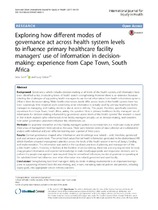| dc.contributor.author | Scott, Vera | |
| dc.contributor.author | Gilson, Lucy | |
| dc.date.accessioned | 2018-09-18T08:41:46Z | |
| dc.date.available | 2018-09-18T08:41:46Z | |
| dc.date.issued | 2017 | |
| dc.identifier.citation | Scott, V. & Gilson, L. (2017). Exploring how different modes of governance act across health system levels to influence primary healthcare facility managers’ use of information in decisionmaking: experience from Cape Town, South Africa. International Journal for Equity in Health, 16: 159 | en_US |
| dc.identifier.issn | 1475-9276 | |
| dc.identifier.uri | http://dx.doi.org/10.1186/s12939-017-0660-5 | |
| dc.identifier.uri | http://hdl.handle.net/10566/4054 | |
| dc.description.abstract | BACKGROUND: Governance, which includes decision-making at all levels of the health system, and information have
been identified as key, interacting levers of health system strengthening. However there is an extensive literature
detailing the challenges of supporting health managers to use formal information from health information systems
(HISs) in their decision-making. While health information needs differ across levels of the health system there has
been surprisingly little empirical work considering what information is actually used by primary healthcare facility
managers in managing, and making decisions about, service delivery. This paper, therefore, specifically examines
experience from Cape Town, South Africa, asking the question: How is primary healthcare facility managers’ use of
information for decision-making influenced by governance across levels of the health system? The research is novel
in that it both explores what information these facility managers actually use in decision-making, and considers
how wider governance processes influence this information use.
METHODS: An academic researcher and four facility managers worked as co-researchers in a multi-case study in which
three areas of management were served as the cases. There were iterative cycles of data collection and collaborative
analysis with individual and peer reflective learning over a period of three years.
RESULTS: Central governance shaped what information and knowledge was valued – and, therefore, generated
and used at lower system levels. The central level valued formal health information generated in the district-based HIS
which therefore attracted management attention across the levels of the health system in terms of design, funding
and implementation. This information was useful in the top-down practices of planning and management of the
public health system. However, in facilities at the frontline of service delivery, there was a strong requirement for local,
disaggregated information and experiential knowledge to make locally-appropriate and responsive decisions, and to
perform the people management tasks required. Despite central level influences, modes of governance operating at
the subdistrict level had influence over what information was valued, generated and used locally.
CONCLUSIONS: Strengthening local level managers’ ability to create enabling environments is an important leverage
point in supporting informed local decision-making, and, in turn, translating national policies and priorities, including
equity goals, into appropriate service delivery practices. | en_US |
| dc.language.iso | en | en_US |
| dc.publisher | BMC | en_US |
| dc.rights | © The Author(s). 2017 Open Access This article is distributed under the terms of the Creative Commons Attribution 4.0
International License (http://creativecommons.org/licenses/by/4.0/), which permits unrestricted use, distribution, and
reproduction in any medium, provided you give appropriate credit to the original author(s) and the source, provide a link to
the Creative Commons license, and indicate if changes were made. The Creative Commons Public Domain Dedication waiver
(http://creativecommons.org/publicdomain/zero/1.0/) applies to the data made available in this article, unless otherwise stated. | |
| dc.subject | Governance | en_US |
| dc.subject | Health system | en_US |
| dc.subject | Health managers | en_US |
| dc.subject | Health information systems (HISs) | en_US |
| dc.title | Exploring how different modes of governance act across health system levels to influence primary healthcare facility managers’ use of information in decisionmaking: experience from Cape Town, South Africa | en_US |
| dc.type | Article | en_US |
| dc.privacy.showsubmitter | FALSE | |
| dc.status.ispeerreviewed | TRUE | |
| dc.description.accreditation | ISI | |

